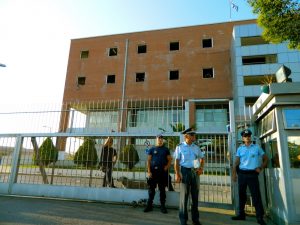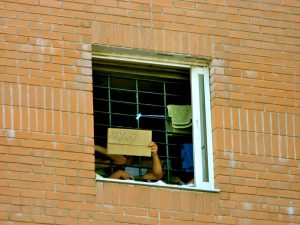Hiermit solidarisieren wir uns mit dem seit 2002 in Griechenland inhaftierten Dimitris Koufontinas und seinem Hungerstreik.
Wir sind empört über die staatliche Willkür, mit der die Haftbedingungen von Dimitris verschlimmert werden, und wünschen ihm Kraft & Durchhaltevermögen in seinem aktuellen und schon lebensbedrohlichen Hunger- und Durststreik!
In Solidarität mit Dimitris teilen wir den weiter unten folgenden Artikel, der durch den “Freitag” veröffentlicht wurde.
Our passion for freedom is stronger than their prisons!

—————————————————
Link zum Originalartikel: https://www.freitag.de/autoren/der-freitag/dimitris-koufontinas-droht-zu-sterben
Dimitris Koufontinas droht zu sterben
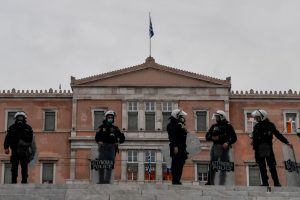
Seit Jahrzehnten erleben wir ein „Rollback“ des Neoliberalismus, verbunden mit dem Abbau des Sozialstaats und staatlicher Für- und Vorsorge sowie einer Verpflichtung des Individuums zum Selbstschutz. In der Corona-Krise ist das besonders deutlich geworden. Gleichzeitig gilt auch: Es gibt wenig Widerstand gegen politische Maßnahmen und die sozialen Härten, die mit ihnen verbunden sind, weder durch Streiks oder gewerkschaftliche Kampfmaßnahmen noch auf der Straße, also durch Demonstrationen und Protestkundgebungen, denn die Menschen sorgen sich vor allem um sich selbst. Das verschafft den Regierenden neue Spielräume. In anderen Staaten wird die Situation der Angst vor der Pandemie noch sehr viel mehr ausgenutzt als in Deutschland. Ich will das am Beispiel Griechenlands zeigen.
Lockdown und autoritäre Maßnahmen
Die Lockdowns im Frühjahr und seit Anfang November 2020 bis heute waren und sind in Griechenland schärfer als in Deutschland und den meisten anderen europäischen Ländern. Man darf nur aus dem Haus, wenn man eine SMS geschickt (oder eine entsprechende Erklärung ausgefüllt) hat, in der man den Grund angibt. Die Polizei kontrolliert und erhebt bei Verstößen Bußgelder in Höhe von 300 Euro. Man darf nicht besuchen oder besucht werden. Wird man erwischt, drohen Bußen bis zu 3.000 Euro.
Seit Beginn der Corona-Krise sind eine Reihe reaktionärer Gesetze verabschiedet und Notverordnungen erlassen worden. So bescherte man uns ein neues Versammlungsgesetz – abgeschrieben vom entsprechenden Gesetz der Militärjunta (1967-1974) –, neue Arbeitsgesetze, die Entlassungen erleichtern und den 10-Stunden-Tag ohne Lohnausgleich erlauben, die „Weltneuheit“ einer Universitätspolizei (mit insgesamt 1.000 Polizisten) – um nur einige zu nennen.
Wider die Verfassung erließ die Polizei für vier Tage um den 17. November – Tag des Aufstands am Athener Polytechnikum 1973 und der traditionellen Demonstration gegen die amtierende Regierung, den US-Imperialismus und die US-amerikanischen Basen – ein absolutes Versammlungsverbot, vollkommen absurd begründet mit COVID-Prävention. Ein solches Verbot erging auch für den 6. Dezember, den Jahrestag der Ermordung von Alexis Grigoropoulos durch einen Polizisten 2008, an dem jedes Jahr eine Demonstration gegen staatliche Gewalt stattfindet. Gerade für den 17. November gibt es keine gesetzliche Möglichkeit der Einschränkung der verfassungsmäßig garantierten Versammlungsfreiheit. Trotzdem setzte die Regierung ihr willkürliches Verbot mit dem Einsatz von 5.000 Polizisten weitgehend durch.
Während der Corona-Krise verschärfte die rechtskonservative Regierung Mitsotakis außerdem die Lebensbedingungen für Geflüchtete in Lagern noch einmal dramatisch. Die Lager wurden teilweise für Wochen abgeriegelt, weil Corona-Fälle aufgetreten waren, ohne dass ausreichend medizinisches Personal abgestellt wurde. Die Lagerinsassen wurden einfach sich selbst überlassen. Das Lager Moria II auf Lesbos ist schlimmer als das Anfang September 2020 abgebrannte Moria I. Die Geflüchteten leben im Dreck, haben keine ausreichenden Waschgelegenheiten und ärztliche Versorgung. Viele sind krank und werden mit ihrer Krankheit allein gelassen. Die Pushbacks von Flüchtlingen zurück in die Türkei, sei es auf dem Meer oder über die Landgrenze in Nordgriechenland, haben im vergangenen Jahr weiter zugenommen.
Der Fall Dimitris Koufontinas
Das jüngste Beispiel dafür, dass der griechischen Regierung sogar ihre eigenen Gesetze gleichgültig sind, ist der Fall Koufontinas. Dimitris Koufontinas verbüßt eine Haftstrafe von 11 Mal lebenslänglich zuzüglich 25 Jahre, nachdem er als Mitglied der Revolutionären Organisation 17. November (17N) verurteilt wurde. Der 17N war in Griechenland aktiv von 1975 bis 2002, bevor er nach einem missglückten Anschlag zerschlagen wurde. Er trat zuerst mit der Erschießung des amerikanischen CIA-Chefs für Südosteuropa in Erscheinung. (Später erfolgten noch drei weitere Anschläge auf US-Offizielle.) Seitdem war die Ausschaltung des 17N eine grundlegende Forderung der USA, mit großem Druck auf die jeweiligen griechischen Regierungen. 1989 erschoss der 17N den Politiker und Journalisten P. Bakogiannis, Schwager des jetzigen Premierministers und Vater des derzeitigen Bürgermeisters von Athen.
Dimitris Koufontinas stellte sich 2002 nach der Verhaftung mehrerer Mitglieder des 17N und erklärte, er sei Mitglied der Organisation und übernehme die politische Verantwortung für deren Handlungen. Er verteidigte sich nicht und machte nie Aussagen zu seinen Mitangeklagten. Diese Haltung brachte ihm Anerkennung in breiteren Teilen der griechischen Gesellschaft, nicht nur der Linken, ein.
Ab 2002 war Dimitris Koufontinas in einem speziell für die Gefangenen des 17N hergerichteten unterirdischen Flügel des Korydallos-Gefängnisses (Athen) inhaftiert, bis er 2018 in die landwirtschaftliche Haftanstalt Volos verlegt wurde. Obwohl er seit 2010 Anspruch auf Lockerungen hatte, bekam er sie 2017 zum ersten Mal und in der Folge noch fünf weitere Male. Die Gewährung von Hafturlaub für Koufontinas wurde jedoch von bestimmten Medien, aber auch von Politikern, die mit öffentlichen Äußerungen und Interventionen unter Nennung seines Namens gegen ihn auftraten, intensiv und systematisch bekämpft. Unter ihnen waren auch der heutige Premierminister und Mitglieder seiner Familie. Heftige Interventionen gab es auch seitens der amerikanischen Botschaft.
Infolge dieser Polemik wurden die Hafturlaube ab dem Frühjahr 2019 verweigert mit Begründungen, die mit seinen politischen Überzeugungen zusammenhängen, und seiner Weigerung, Reue zu erklären – was nach griechischem Recht kein Grund für die Verweigerung von Lockerungen ist. Die Frage der Hafturlaube kam bis vor den Obersten Gerichtshof (Areopag), der entschied, dass die Ablehnung der entsprechenden Anträge nicht vom Gesetz gedeckt sei. Das für die Gewährungen von Lockerungen zuständige Gericht in Volos änderte jedoch seine Auffassung nicht und so wurden die Hafturlaube ab 2019 endgültig verweigert.
Der Freitag ist eine Wochenzeitung, die für mutigen und unabhängigen Journalismus steht. Wir berichten über Politik, Kultur und Wirtschaft anders als die übrigen Medien. Überzeugen Sie sich selbst, und testen Sie den Freitag 3 Wochen kostenlos!
Der Präsident der jetzt regierenden Partei Neue Demokratie, Kyriakos Mitsotakis, hatte vor den Wahlen 2019 öffentlich versprochen, dass er diesen bestimmten Häftling, wenn er an die Macht käme, von Lockerungen und von der Strafverbüßung in Landwirtschafts-Gefängnissen ausschließen werde. Tatsächlich wurde im Dezember 2020 das Gesetz 4760/2020 veröffentlicht, in dem eine Bestimmung enthalten ist, die die Gewährung von Hafturlaub für Personen, die wegen „terroristischer“ Straftaten verurteilt wurden, sowie deren Inhaftierung in Landwirtschafts-Gefängnissen ausschließt.
Einziger Verurteilter dieser Kategorie in einem Landwirtschaftlichen Gefängnis war Koufontinas. Während der Gesetzesdebatte im Parlament wurde er namentlich als Adressat benannt. Am 21. Dezember 2020 wurde Koufontinas aus dem Landwirtschaftlichen Gefängnis in das Gefängnis Domokos verlegt, in Art einer Entführung (ohne Ankündigung, ohne Kontakt mit seiner Familie aufnehmen zu können und ohne Zeit zu haben, seine persönlichen Sachen zu packen und sich zu verabschieden). In Domokos wurde er mit anderen Gefangenen in eine erstickend kleine Zelle gesperrt, in der er weder Raum und Zeit für sich selbst hatte und das Rauchen und die anderen Bedürfnisse der Mithäftlinge aushalten musste. So durchlebte Dimitris Koufontinas, jetzt 63 Jahre alt, eine dramatische Verschlechterung seiner Haftbedingungen.
Polizeistaatsmethoden
Die Willkür staatlichen Handelns im Fall Koufontinas erkennt man daran, dass diese Überstellung in ein anderes Gefängnis sogar gegen die Bestimmungen des jüngsten nur gegen ihn gerichteten Gesetzes verstieß. Denn nach diesem Gesetz hätte er nach Korydallos zurückgebracht werden müssen, wo er die vorherigen 16 Jahre inhaftiert war. (Das ist übrigens auch das Gefängnis in der Nähe des Wohnorts seiner Familie.)
Das zuständige Ministerium erließ dazu einen Verwaltungsakt mit einer vollständig unwahren Behauptung. Demnach sei er nach Korydallos und sodann mit einer neuen Entscheidung nach Domokos verlegt worden – was nicht stimmt; er kam nie in Korydallos an. Offenbar wollte der Minister der Verlegung in das andere Gefängnis zumindest den Anschein gesetzesmäßigen Vorgehens geben. Dass er dafür dreist lügen musste, war ihm offenbar egal.
Ein Teil der Öffentlichkeit reagierte jedoch auf diese Lügen mit Unverständnis und Nachfragen, so dass sich das Ministerium zu einer weiteren Stellungnahme gezwungen sah. Diese unterschied sich von der ersten nur insofern, als die damaligen Lügen durch neue ersetzt wurden. So ist darin zu lesen, dass die Verlegung nach Domokos auf einem Beschluss des zuständigen Gefängnis-Gremiums vom 4. Januar 2021 beruhe; die Verlegung erfolgte aber bereits am 21. Dezember 2020 (s. o.). Post-truth politics, Trump hat es vorgemacht.
Aus dem politischen Kontext des Falls geht hervor, dass Koufontinas’ Verlegung auf die Rachsucht der Familie Mitsotakis-Bakoyannis und den Druck der US-Botschaft zurückzuführen ist. Mitglieder der derzeitigen Regierung hatten bereits früher angekündigt und sich darauf festgelegt, die Haftbedingungen dieses bestimmten Gefangenen zu verschlechtern. Dafür wurde das „Koufontinas-Gesetz“ erlassen.
Auch dieses Gesetz scheint jedoch der Familie und der Botschaft nicht genug zu sein. Er durfte nicht nach Korydallos zurück verlegt werden, sondern musste nach Domokos, um die Strafe innerhalb der Strafe erniedrigend und unerträglicher zu gestalten. Dafür wurde gegen die Gesetze verstoßen, sogar gegen diejenigen, die sowieso nur erlassen wurden, um die Bedingungen von Koufontinas’ Strafverbüßung zu verschlechtern. Das ist selbst für Griechenland ein wohl beispielloser Fall willkürlichen Eingriffs in das Rechts- und Justizsystem. Besonders widerlich ist, dass dieser Eingriff aus Gründen der persönlichen Rache einer politisch mächtigen Familie und der US-Botschaft erfolgte.
Hunger- und Durststreik
Nach der bewusst unrichtigen Bestätigung des Ministeriums beschloss Dimitris Koufontinas, gegen all diese ausschließlich gegen ihn gerichteten Methoden zu protestieren und zu fordern, nach Korydallos verlegt zu werden, so wie das jüngst ergangene Gesetz es vorsieht. Um seiner Forderung Nachdruck zu verleihen, trat er in den Hungerstreik. Heute (22. Februar 2021) ist der 46. Tag seines Hungerstreiks, er ist völlig abgemagert, kann sich nicht mehr bewegen, kann kaum noch sprechen, kann nicht mehr selbständig trinken und hat teilweises Nierenversagen. Er wurde am 17. Februar in die Intensivabteilung des örtlichen Krankenhauses verlegt.
Koufontinas hat heute erklärt, dass er die weitere Zuführung von Flüssigkeit durch den Tropf ablehne. Da er nicht mehr selbständig trinken kann, bedeutet das den Beginn eines Durststreiks. Das bedeutet, dass, wenn die Regierung nicht einlenkt, Dimitris Koufontinas in drei, vier, maximal fünf Tagen sterben wird.
Natürlich gab es gegen diese Behandlung von Koufontinas Proteste in der griechischen und auch der außergriechischen demokratischen Öffentlichkeit. Es haben sich Politiker, Intellektuelle, Kunstschaffende und Wissenschaftler zu Wort gemeldet. Auch im Fall Koufontinas kommt der Regierung zupass, dass sie Presse, Fernsehen und andere Medien zu Beginn der Corona-Krise weitgehend gleichgeschaltet hat. Das hat sie allerdings nicht durch Repression erreicht, sondern durch viel Geld, mit dem Vorwand, es handele sich um Zuschüsse für die Corona-Kampagne „Wir bleiben zuhause“. (Die Liste der Empfänger mit den auf die einzelnen Medien entfallenden Beträgen ist im Juni 2020 von der Regierung bekannt gegeben geworden.) Es gibt nur noch eine einzige größere regierungskritische Tageszeitung und einen Radiosender, aber keinen einzigen kritischen TV-Kanal mehr. Fast alle Medien sind heute auf Regierungskurs.
Ergebnis dieser Gleichschaltung: Obwohl die Politiker, Intellektuellen, Kunstschaffenden und Wissenschaftler klargestellt haben, dass sie weder mit den politischen Ansichten von Koufontinas und schon gar nicht seinen Taten übereinstimmen, werden sie von den regierungstreuen Medien als Terroristen-Unterstützer gebrandmarkt. Dass dies teilweise nicht zur Isolierung der Protestierenden führte, sondern noch mehr Menschen dazu brachte, die vollständig mit dem geltenden Recht in Übereinstimmung stehende Forderung von Koufontinas’ Verlegung nach Korydallos zu unterstützen, gereicht allen Unterschreibenden zur Ehre.
Das ist umso wichtiger, da die Regierung alle öffentlichen Proteste zu unterdrücken versucht. Protestdemonstrationen auf der Straße wurden und werden entweder gar nicht erst zugelassen, weil die gesamte Innenstadt von Athen voll von Polizei und der Kundgebungsplatz weiträumig abgesperrt ist. Gruppen von Protestierenden werden innerhalb von wenigen Minuten auseinandergeknüppelt beziehungsweise mit Tränengas eingenebelt. Gesetzwidrig, verfassungswidrig – es schert die Regierung nicht. Wie wir schon am 17. November und 6. Dezember gesehen haben, haben wir es unter der ND-Regierung mit Polizeistaatsmethoden zu tun. Die griechische Regierung hat sich viel von Ungarn und der Türkei abgeguckt und kann das Gelernte jetzt während des Lockdowns ohne viel Widerstand anwenden. Sozial- und Rechtsstaat werden mehr und mehr abgeschafft, Polizeierlasse treten an Stelle der sozialen Für- und Vorsorge und der geltenden Gesetze. Die gleichgeschalteten Medien spenden Beifall. So hat sich Griechenland in den letzten Jahren zu einer totalitären (parlamentarischen) Demokratie entwickelt.
Achim Rollhäuser ist Aktivist und Anwalt. Er lebt seit 1990 abwechselnd in Deutschland und Griechenland

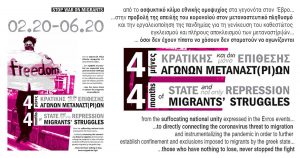
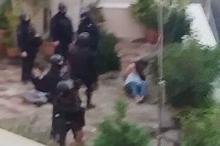 18.12.2019: Nach der gestrigen Räumung der Villa Kouvelos in Marousi erfolgten heute morgen 3 weitere Räumungen in Koukaki, einem Stadtteil östlich der Akropolis. Die Bewohner hatten sich verbarrikadiert und die Cops mussten sich gewaltsam Zugang über die Nachbargebäude verschaffen. Dabei überrumpelten sie Nachbarn und mißhandelten jene, die nicht kooperieren wollten. Ein Anwohner wurde mit dem Kopf auf den Steinboden geworfen, andere Bewohner mussten halbnackt und gefesselt im Hinterhof vor vermummten Spezialeinheiten knien, es gab 10 Festnahmen.
18.12.2019: Nach der gestrigen Räumung der Villa Kouvelos in Marousi erfolgten heute morgen 3 weitere Räumungen in Koukaki, einem Stadtteil östlich der Akropolis. Die Bewohner hatten sich verbarrikadiert und die Cops mussten sich gewaltsam Zugang über die Nachbargebäude verschaffen. Dabei überrumpelten sie Nachbarn und mißhandelten jene, die nicht kooperieren wollten. Ein Anwohner wurde mit dem Kopf auf den Steinboden geworfen, andere Bewohner mussten halbnackt und gefesselt im Hinterhof vor vermummten Spezialeinheiten knien, es gab 10 Festnahmen. Athens, August 26. Alert! What we have been announcing to you for a month and a half has just begun this morning (yesterday morning, Enough 14), just before dawn. Athens’ famous rebel and supportive neighbourhood is completely surrounded by huge police forces: many riot police buses (MAT), anti-terrorist untis (OPKE), police on motorbikes (DIAS), members of the secret police (asfalitès), as well as a helicopter and several drones.
Athens, August 26. Alert! What we have been announcing to you for a month and a half has just begun this morning (yesterday morning, Enough 14), just before dawn. Athens’ famous rebel and supportive neighbourhood is completely surrounded by huge police forces: many riot police buses (MAT), anti-terrorist untis (OPKE), police on motorbikes (DIAS), members of the secret police (asfalitès), as well as a helicopter and several drones.
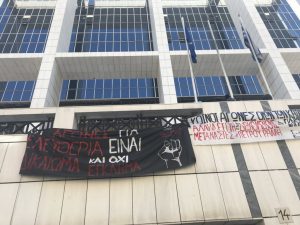
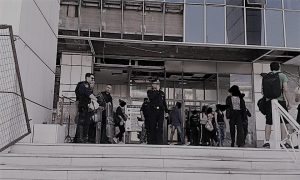


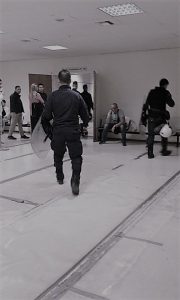
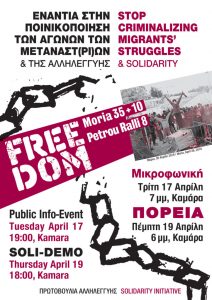
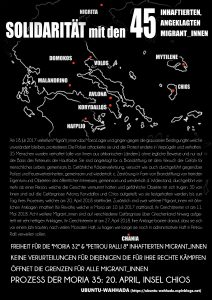
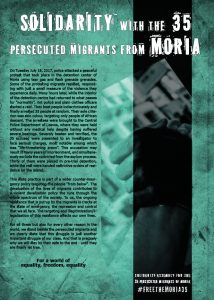 Weiterhin wird auch Solidarität kriminalisiert, so wie die 3 Mitglieder der ehemaligen No Lager Gruppe, welche am 23. April in Drama vor Gericht stehen müssen, angeklagt für “Provokation zu Straftaten”, da sie an einem solidarischen Besuch zum Abschiebeknast Paranesti im Frühling 2015 teilgenommen hatten, wo zum gleichen Zeitpunkt ein Hungerstreik stattfand. Die drei (griechischen) Aktivist_innen sind nicht mit schweren Anklagen bedroht wie im Falle von Moria oder Petrou Ralli die Migrant_innen, aber die Kriminalisierung der Solidarität ist ernst in ihrer Sache selbst schon.
Weiterhin wird auch Solidarität kriminalisiert, so wie die 3 Mitglieder der ehemaligen No Lager Gruppe, welche am 23. April in Drama vor Gericht stehen müssen, angeklagt für “Provokation zu Straftaten”, da sie an einem solidarischen Besuch zum Abschiebeknast Paranesti im Frühling 2015 teilgenommen hatten, wo zum gleichen Zeitpunkt ein Hungerstreik stattfand. Die drei (griechischen) Aktivist_innen sind nicht mit schweren Anklagen bedroht wie im Falle von Moria oder Petrou Ralli die Migrant_innen, aber die Kriminalisierung der Solidarität ist ernst in ihrer Sache selbst schon.